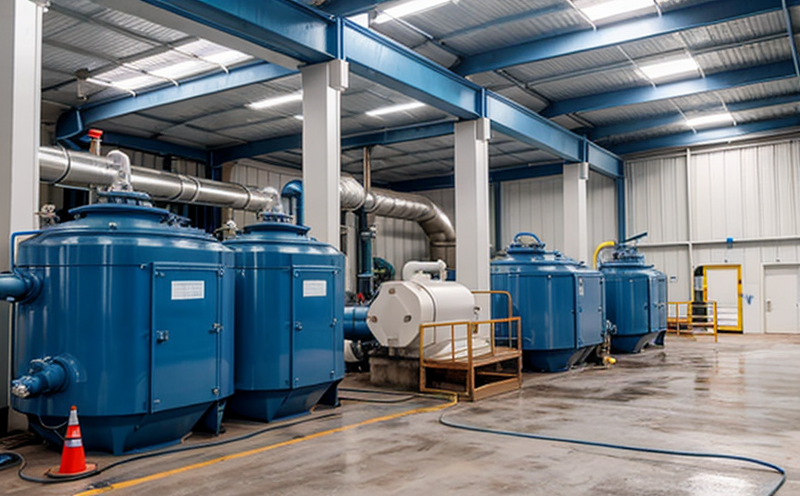EPA Vessel General Permit (VGP) Compliance Testing for Ballast Water
The Environmental Protection Agency’s (EPA) VGP is a regulatory framework designed to reduce pollution from vessels, including the discharge of ballast water. The EPA’s 2013 VGP specifically targets the issue of invasive species and pathogens introduced into U.S. waters through ballast water exchange. Compliance with this permit is mandatory for all vessels operating in U.S. waters under certain tonnage thresholds.
To achieve compliance, vessel operators must ensure that their ballast water treatment systems meet stringent performance standards set by the EPA. The primary objective of these tests is to verify whether the system can effectively remove or kill harmful organisms and pathogens present in the ballasted water before it is discharged into U.S. waters. This service ensures that vessels are not only compliant with regulatory requirements but also contribute to environmental protection.
The testing process involves several key steps, each meticulously designed to evaluate different aspects of the system's performance:
- Sample Collection: Samples are collected from the ballast water tank and shipped to our laboratory for analysis. This step is crucial as it ensures that the samples represent the actual discharge conditions.
- Microbial Analysis: Using advanced microbiological methods, we analyze the sample for various indicators of compliance with VGP standards. This includes counting viable organisms and identifying species present in the water.
- Chemical Analysis: Conducted to ensure that no harmful chemicals are introduced during treatment processes, this analysis checks for regulated substances such as chlorination byproducts or other potential contaminants.
- Physical Properties Testing: This includes assessing temperature, salinity levels, and turbidity of the treated water, ensuring it meets physical parameters set forth by EPA guidelines.
- Data Interpretation & Reporting: Our team interprets all test results against established criteria outlined in EPA regulations (e.g., EPA 9500). A comprehensive report detailing compliance status, areas needing improvement if any, along with recommendations is provided.
The importance of this service cannot be overstated. Non-compliance can lead to significant fines and reputational damage for shipping companies. By partnering with us, vessel operators gain peace of mind knowing they are fulfilling their legal obligations while contributing positively to environmental stewardship.
Our state-of-the-art facilities equipped with cutting-edge technology allow us to provide accurate, reliable test results within the required timeframe. This not only helps in meeting statutory deadlines but also enables proactive management strategies aimed at continuous improvement and adherence to evolving standards.
Why It Matters
Compliance with EPA VGP for ballast water treatment is critical for several reasons:
- Legal Obligation: Failure to comply can result in substantial penalties imposed by the EPA, leading to increased operational costs and potential legal issues.
- Environmental Protection: Properly treating ballast water prevents the introduction of non-native species and pathogens into U.S. waters, thereby protecting native ecosystems and biodiversity.
- Reputation Management: Ships operating in compliance with EPA regulations enhance their reputation among stakeholders, including customers, regulatory bodies, and environmental groups.
- Operational Efficiency: Regular testing helps identify potential malfunctions early on, minimizing disruptions to scheduled voyages and reducing maintenance downtime.
The stakes are high when it comes to compliance. Inadequate treatment can lead to severe ecological consequences, including the establishment of invasive species that alter local marine environments irreversibly. Additionally, non-compliance could result in operational inefficiencies due to unexpected shutdowns for remedial actions or additional treatments.
Customer Impact and Satisfaction
Our customers benefit greatly from our EPA VGP compliance testing services:
- Enhanced Compliance Assurance: With detailed reports highlighting every aspect of the treatment process, vessel operators have clear evidence demonstrating their commitment to regulatory requirements.
- Improved Operational Efficiency: By identifying potential issues early through regular testing, operators can make necessary adjustments without interrupting critical operations or schedules.
- Eco-Friendly Practices: Our tests ensure that the treatment methods employed do not introduce harmful substances into the environment, promoting sustainable practices that align with global environmental policies.
- Customer Trust and Satisfaction: Providing reliable data and actionable insights builds trust between vessel operators and their stakeholders, including regulatory authorities and public interest groups.
We strive to deliver high-quality services tailored specifically to each customer's needs. Our approach ensures not only compliance but also excellence in performance, setting benchmarks for the industry.
Competitive Advantage and Market Impact
In today’s competitive maritime sector, maintaining strict adherence to environmental regulations is a key differentiator:
- Regulatory Leadership: By staying ahead of regulatory changes and implementing best practices, our clients gain an edge over competitors.
- Eco-Led Branding: Adopting environmentally responsible measures enhances brand image, attracting eco-conscious customers who value sustainability.
- Potential for Innovation: Compliance testing fosters innovation within the organization, driving research and development efforts towards more efficient treatment technologies.
- Long-Term Cost Savings: Proactive compliance management reduces long-term costs associated with potential fines or rejections during port inspections.
The market for sustainable shipping solutions is growing rapidly. Companies that demonstrate a strong commitment to environmental stewardship through rigorous testing and continuous improvement will find themselves better positioned in this evolving landscape.





